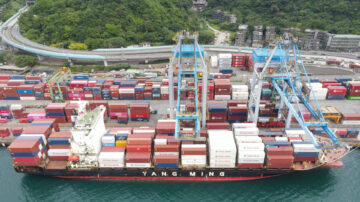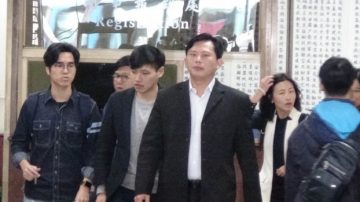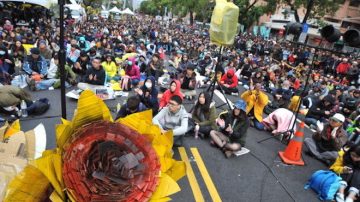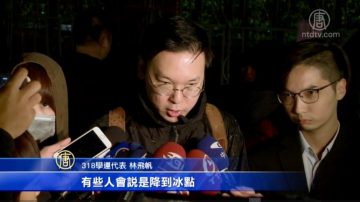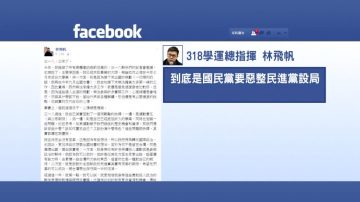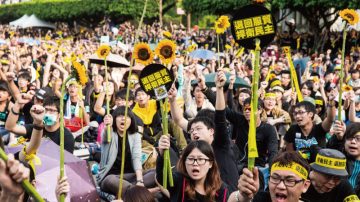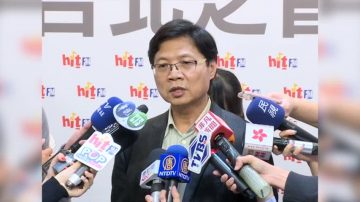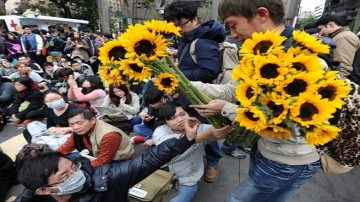【新唐人2014年03月26日訊】台灣學生佔據國會,反對立法院通過《海峽兩岸服務貿易協議》的抗爭,已經進入第8天。經過前一天部分學生因轉戰行政院,被警方強制驅離後,目前,學生「反服貿」的這場抗爭,仍回到立法院議場。25號上午,台灣的「中華民國」總統馬英九釋出善意,願意接見學生,學生也呼籲「公開對話」,並從「兩岸協議監督法制化」優先談起。但當天晚間,學生再開記者會婉拒了總統府的邀請。
台灣「反服貿」學生代表下午3點開記者會回應總統﹕願意與府會對話,但仍要從兩個問題上做具體的討論。第一,「兩岸協議監督」是否有法制化的必要﹔第二,在《服貿協議》審查之前,是否應先完成「兩岸協議監督」的法制化。
有很多台灣民眾反對「服貿」開放,是基於﹕兩岸產業在開放投資的政策底下,弱勢族群的權益將被犧牲。如醫療方面的老人和殘障照顧,一旦被中國大陸投資者壟斷,台灣這批弱勢族群的權益,只能按照資方提供的服務標準,窮人的權益恐怕會被犧牲。
又如媒體的壟斷,影響的層面更大,牽連台灣政治意識形態及公民言論自由等民主模式的權益。
許多香港人也擔憂台灣將成為下一個香港﹗有的香港人認為,《服貿協議》是中共統戰台灣的手段,是中共殖民台灣的合法保護罩。
中國資深媒體人高瑜﹕「從大陸對香港的態度,基本上這17年一國兩制是失敗的,因為越來越看到﹕對法律的獨立、媒體,大部分都淪陷了。所以在這種情況下,台灣學生看到了這一點。」
香港「嶺南大學」中文系助理教授陳雲在博客評論說﹕「台灣的《服貿協議》,考驗台灣人的本土意識。《服貿協議》一旦通過,中共將傾盡資金,收購台灣,而台灣擁有資產的大財閥和小業主,都會沾到利益,自己套現之後,哪管洪水滔天,台灣企業將為大陸而生產,房產為大陸人擁有,台灣人將無立錐之地,萬劫不復。」
高瑜﹕「通過這幾年的發展,我覺得台灣認清了不能以經濟來代替政治。大陸政治上面的高壓獨裁,也影響到經濟,像這種服貿協定,也影響到它的通過,所以我覺得這是一國兩制的失敗。」
旅美經濟學家何清漣在《美國之音》提出,「台灣已經民主化,實行自由市場制度,沒有行業准入的各種政治限制。而中國的情況不一樣,是在政府管控下的半行政化干預市場經濟。這種體制的國家與任何民主國家的交流,很容易憑藉制度的不同,獲取利益。」
何清漣以媒體業為例表示,「2001年中國加入WTO之後,承諾今後數年內逐步放開。此後,中國在海外大肆推行『大外宣』計劃,《新華社》多語種媒體在美、歐及全世界相繼落地並設立記者站,收購英文媒體,各種外宣刊物如雨後春筍。以美國為例,所有由中共控制的媒體(包括網站)可以自由的批評美國的一切,從政治、外交政策到經濟社會。」而「外國媒體不但沒有得到相同的待遇,反而受到嚴厲控制。」
與此同時,現年84歲,旅居美國的台灣「中央研究院」院士余英時,24號也發文力挺台灣「反服貿」學生。
他表示,「中共一直在千方百計的企圖摧毀台灣的民主」,而「民主是台灣安全的最大保證」,「在民主體制之下,人民和政府之間往往存在分歧和衝突,但不可能是敵對的。因為不民主、非民主或反民主的政府已不復有存在的空間。」大陸「通過經濟以發揮政治影響的障眼法」已被識破。
余英時提醒,「台灣的人民和政府都必須把警惕提到最高的程度」。
目前,台灣有多所大學的師、生甚至校長力挺「反黑箱服貿學運」,已有50多大學系所響應「罷課」。
採訪/陳漢 編輯/周平 後製/孫寧
Taiwanese Students Welcome Negotiations, Appeal to Legislate
First; Pass Trade Agreement Later
It has been eight days since Taiwanese students occupied
parliament in protest of the Cross-Strait Service Trade Agreement.
Some students were forced to leave by the police
at the Executive Yuan yesterday, spurring students to return
to the Legislative Yuan in protest.
On the morning of the 25th, Taiwan President Ma Ying-jeou
offered to meet with students and students called for an
"open dialogue" to talk about the cross-strait
Service Trade Agreement first.
At 3 p.m., in response to the President, student representatives
held a press conference to express their welcoming
of the dialogue with the government.
They mentioned that they still want to discuss two points
with the government:
First, is there any legal need for the Cross-Strait Service
Trade Agreement?
Second, before going through the Cross-Strait
Service Trade Agreement, can the Cross-Strait
Agreement Watch be made legal?
The reason many people are against the Trade Agreement
is because this agreement is based on sacrificing
Vulnerable Group's legal right under
an open investment interests.
For example, once the elderly and disabled medical care
are monopolized by Chinese mainland investors,
the disadvantaged groups in Taiwan can only act
as the employer's standards and the interests
will be sacrificed.
Another example is the influence of media monopolization
will involve democratic interests including Taiwan political
ideology and the citizens' freedom of expression.
Many Hong Kong people also worried that Taiwan will
become the next Hong Kong.
Some Hong Kong people believed the trade agreement
is the way to unite Taiwan by CCP and CCP's colonial
legal protection cover.
Chinese senior media people Gao Yu: "Based on
Hong Kong's situation, we can tell it is a seventeen year
failure of the 'one country, two systems'.
As you can see, more and more are occupied,
including legal independence and media.
Taiwanese students already noticed it."
Hong Kong Lingnan University assistant Professor of Chinese
department Chen Yun's blog: "Taiwan's trade agreement
is a test to the indigenous awareness of Taiwanese.
Once the trade agreement passed, the CCP will purchase
Taiwan using all money.
The big and small business owners will benefit
after cashing in without caring about anything.
Taiwanese enterprises will produce for Mainland;
real estate will be owned by Mainland people; Taiwanese
will have no place to stay."
Gao Yu: "Through years of development, I believe Taiwan
recognizes that the economy can't take the place of politics.
The high-pressure mainland political dictatorship also affects
the economy and the pass of the trade agreement.
So I think this is the failure of 'one country ,two systems.'"
US economist He Qinglian told the VOA that Taiwan
has been democratic and there is no political restraint
of trade access under free market system.
In China, the economy is under
semi-administrative control.
It's easy for this country to access benefits through
communication with any democratic country relying on the system."
He Qinglian exemplified the media industry and said,
"When China joined the WTO in 2001, they promised
they will gradually open up.
Following that, the CCP promoted a big propaganda plan
to establish the reporter station for Xinhua News Agency
multilingual media in the United States, Europe and all
over the world.
The purpose being to purchase English media with
the publication of various foreign publicities.
In the United States, all media (including websites)
controlled by the CCP are free to criticize everything
from politics, foreign policy to the economy and society.
However, foreign media is under strict control
without the same treatment."
At the same time, 84-year-old, Taiwan Academia Sinica
Yu Ying-shih, now living in the United States, also issued
a document supporting Taiwan's anti-trade services student
movement on March 24.
He said, "The CCP has been doing everything possible
to destroy Taiwan democracy", and democracy is the greatest
guarantee for Taiwan's security.
"Under the democratic system, even if there is disagreement
and conflict between the people and the government,
hostilities are minimal or non-existent because there is no
space for non-democratic or anti-democratic government.
The Mainland's deceitful attempts to influence politics
through economics has been seen through.
Yu Ying-shih reminded that Taiwanese people
and the government must keep on the highest degree of alert."
Currently, a large number of students and teachers,
even principals from 50 Taiwan universities are out on strike
to support the student movement of an anti-black box
Trade Agreement.
Interview/Chen Han Edit/Zhou Ping Post-Production/Sun Ning
台灣「反服貿」學生代表下午3點開記者會回應總統﹕願意與府會對話,但仍要從兩個問題上做具體的討論。第一,「兩岸協議監督」是否有法制化的必要﹔第二,在《服貿協議》審查之前,是否應先完成「兩岸協議監督」的法制化。
有很多台灣民眾反對「服貿」開放,是基於﹕兩岸產業在開放投資的政策底下,弱勢族群的權益將被犧牲。如醫療方面的老人和殘障照顧,一旦被中國大陸投資者壟斷,台灣這批弱勢族群的權益,只能按照資方提供的服務標準,窮人的權益恐怕會被犧牲。
又如媒體的壟斷,影響的層面更大,牽連台灣政治意識形態及公民言論自由等民主模式的權益。
許多香港人也擔憂台灣將成為下一個香港﹗有的香港人認為,《服貿協議》是中共統戰台灣的手段,是中共殖民台灣的合法保護罩。
中國資深媒體人高瑜﹕「從大陸對香港的態度,基本上這17年一國兩制是失敗的,因為越來越看到﹕對法律的獨立、媒體,大部分都淪陷了。所以在這種情況下,台灣學生看到了這一點。」
香港「嶺南大學」中文系助理教授陳雲在博客評論說﹕「台灣的《服貿協議》,考驗台灣人的本土意識。《服貿協議》一旦通過,中共將傾盡資金,收購台灣,而台灣擁有資產的大財閥和小業主,都會沾到利益,自己套現之後,哪管洪水滔天,台灣企業將為大陸而生產,房產為大陸人擁有,台灣人將無立錐之地,萬劫不復。」
高瑜﹕「通過這幾年的發展,我覺得台灣認清了不能以經濟來代替政治。大陸政治上面的高壓獨裁,也影響到經濟,像這種服貿協定,也影響到它的通過,所以我覺得這是一國兩制的失敗。」
旅美經濟學家何清漣在《美國之音》提出,「台灣已經民主化,實行自由市場制度,沒有行業准入的各種政治限制。而中國的情況不一樣,是在政府管控下的半行政化干預市場經濟。這種體制的國家與任何民主國家的交流,很容易憑藉制度的不同,獲取利益。」
何清漣以媒體業為例表示,「2001年中國加入WTO之後,承諾今後數年內逐步放開。此後,中國在海外大肆推行『大外宣』計劃,《新華社》多語種媒體在美、歐及全世界相繼落地並設立記者站,收購英文媒體,各種外宣刊物如雨後春筍。以美國為例,所有由中共控制的媒體(包括網站)可以自由的批評美國的一切,從政治、外交政策到經濟社會。」而「外國媒體不但沒有得到相同的待遇,反而受到嚴厲控制。」
與此同時,現年84歲,旅居美國的台灣「中央研究院」院士余英時,24號也發文力挺台灣「反服貿」學生。
他表示,「中共一直在千方百計的企圖摧毀台灣的民主」,而「民主是台灣安全的最大保證」,「在民主體制之下,人民和政府之間往往存在分歧和衝突,但不可能是敵對的。因為不民主、非民主或反民主的政府已不復有存在的空間。」大陸「通過經濟以發揮政治影響的障眼法」已被識破。
余英時提醒,「台灣的人民和政府都必須把警惕提到最高的程度」。
目前,台灣有多所大學的師、生甚至校長力挺「反黑箱服貿學運」,已有50多大學系所響應「罷課」。
採訪/陳漢 編輯/周平 後製/孫寧
Taiwanese Students Welcome Negotiations, Appeal to Legislate
First; Pass Trade Agreement Later
It has been eight days since Taiwanese students occupied
parliament in protest of the Cross-Strait Service Trade Agreement.
Some students were forced to leave by the police
at the Executive Yuan yesterday, spurring students to return
to the Legislative Yuan in protest.
On the morning of the 25th, Taiwan President Ma Ying-jeou
offered to meet with students and students called for an
"open dialogue" to talk about the cross-strait
Service Trade Agreement first.
At 3 p.m., in response to the President, student representatives
held a press conference to express their welcoming
of the dialogue with the government.
They mentioned that they still want to discuss two points
with the government:
First, is there any legal need for the Cross-Strait Service
Trade Agreement?
Second, before going through the Cross-Strait
Service Trade Agreement, can the Cross-Strait
Agreement Watch be made legal?
The reason many people are against the Trade Agreement
is because this agreement is based on sacrificing
Vulnerable Group's legal right under
an open investment interests.
For example, once the elderly and disabled medical care
are monopolized by Chinese mainland investors,
the disadvantaged groups in Taiwan can only act
as the employer's standards and the interests
will be sacrificed.
Another example is the influence of media monopolization
will involve democratic interests including Taiwan political
ideology and the citizens' freedom of expression.
Many Hong Kong people also worried that Taiwan will
become the next Hong Kong.
Some Hong Kong people believed the trade agreement
is the way to unite Taiwan by CCP and CCP's colonial
legal protection cover.
Chinese senior media people Gao Yu: "Based on
Hong Kong's situation, we can tell it is a seventeen year
failure of the 'one country, two systems'.
As you can see, more and more are occupied,
including legal independence and media.
Taiwanese students already noticed it."
Hong Kong Lingnan University assistant Professor of Chinese
department Chen Yun's blog: "Taiwan's trade agreement
is a test to the indigenous awareness of Taiwanese.
Once the trade agreement passed, the CCP will purchase
Taiwan using all money.
The big and small business owners will benefit
after cashing in without caring about anything.
Taiwanese enterprises will produce for Mainland;
real estate will be owned by Mainland people; Taiwanese
will have no place to stay."
Gao Yu: "Through years of development, I believe Taiwan
recognizes that the economy can't take the place of politics.
The high-pressure mainland political dictatorship also affects
the economy and the pass of the trade agreement.
So I think this is the failure of 'one country ,two systems.'"
US economist He Qinglian told the VOA that Taiwan
has been democratic and there is no political restraint
of trade access under free market system.
In China, the economy is under
semi-administrative control.
It's easy for this country to access benefits through
communication with any democratic country relying on the system."
He Qinglian exemplified the media industry and said,
"When China joined the WTO in 2001, they promised
they will gradually open up.
Following that, the CCP promoted a big propaganda plan
to establish the reporter station for Xinhua News Agency
multilingual media in the United States, Europe and all
over the world.
The purpose being to purchase English media with
the publication of various foreign publicities.
In the United States, all media (including websites)
controlled by the CCP are free to criticize everything
from politics, foreign policy to the economy and society.
However, foreign media is under strict control
without the same treatment."
At the same time, 84-year-old, Taiwan Academia Sinica
Yu Ying-shih, now living in the United States, also issued
a document supporting Taiwan's anti-trade services student
movement on March 24.
He said, "The CCP has been doing everything possible
to destroy Taiwan democracy", and democracy is the greatest
guarantee for Taiwan's security.
"Under the democratic system, even if there is disagreement
and conflict between the people and the government,
hostilities are minimal or non-existent because there is no
space for non-democratic or anti-democratic government.
The Mainland's deceitful attempts to influence politics
through economics has been seen through.
Yu Ying-shih reminded that Taiwanese people
and the government must keep on the highest degree of alert."
Currently, a large number of students and teachers,
even principals from 50 Taiwan universities are out on strike
to support the student movement of an anti-black box
Trade Agreement.
Interview/Chen Han Edit/Zhou Ping Post-Production/Sun Ning

